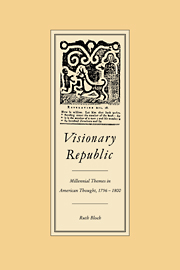Book contents
- Frontmatter
- Contents
- Acknowledgments
- Introduction
- PART I THE DEVELOPMENT OF A MILLENNIAL TRADITION IN COLONIAL AMERICA
- 1 Millennialism and the origins of Anglo-American radicalism
- 2 Colonial millennialism on the eve of the revolutionary crisis
- PART II THE RISE AND DECLINE OF MILLENNIALISM IN THE REVOLUTIONARY ERA
- PART III THE ESCHATOLOGICAL REVIVAL OF THE 1790'S
- Notes
- Index
2 - Colonial millennialism on the eve of the revolutionary crisis
Published online by Cambridge University Press: 29 October 2009
- Frontmatter
- Contents
- Acknowledgments
- Introduction
- PART I THE DEVELOPMENT OF A MILLENNIAL TRADITION IN COLONIAL AMERICA
- 1 Millennialism and the origins of Anglo-American radicalism
- 2 Colonial millennialism on the eve of the revolutionary crisis
- PART II THE RISE AND DECLINE OF MILLENNIALISM IN THE REVOLUTIONARY ERA
- PART III THE ESCHATOLOGICAL REVIVAL OF THE 1790'S
- Notes
- Index
Summary
This know also, that in the last days perilous times shall come.
2 Timothy 3:1The 1750's, like the 1740's, were years of great eschatological expectation. Not even during the high tide of the Great Awakening did colonial presses issue as much millennial literature as they did in the following decade. If, in this relatively literate society, the sheer numbers of publications on the subject can be taken as a rough index to cultural preoccupations, more Americans thought about the Last Days in the late 1750's than ever before. Unlike the evangelical Calvinist millennialism of the Great Awakening, moreover, the millennialism of the 1750's cut across the religious divisions created by the revivals. Now Old Lights as well as New Lights embraced a millennial view of the future, and rarely did prophetic pronouncements address the emotional, theological, and ecclesiastical issues that had divided them previously. Much of the millennial literature published in the 1750's was aimed at a more general audience than any particular religious group, and no longer were most of the works written by leaders of the New England clergy, such as Edwards and Prince. Many authors were obscure or anonymous. A few of them were distant historical, even legendary, figures whose reputations as millennial prophets had been passed down in religious folklore through the generations.
Both the volume and the content of the millennial literature printed in the 1750's attests to the general reduction of religious antagonism as the Great Awakening, at least in the northern colonies, petered out. In part the burgeoning interest in millennial speculation can be explained by events that had nothing to do with revivalism at all.
- Type
- Chapter
- Information
- Visionary RepublicMillennial Themes in American Thought, 1756–1800, pp. 22 - 50Publisher: Cambridge University PressPrint publication year: 1985



